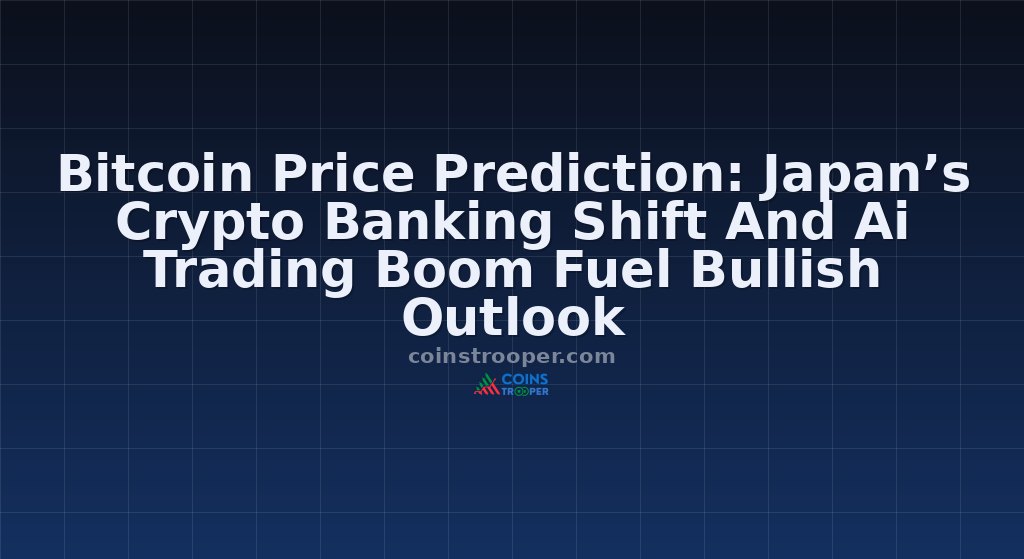Bitcoin Price Prediction: Japan’s Crypto Banking Shift And Ai Trading Boom Fuel Bullish Outlook

- Japan is weighing a landmark policy shift that could let banks hold and trade Bitcoin, marking a major step toward mainstream crypto integration.
- The Financial Services Agency’s proposal would treat digital assets like traditional securities, aligning with Japan’s growing institutional participation.
- The Financial System Council, which advises the prime minister, is expected to review the proposal in the coming weeks.
- The move comes as Japan’s crypto market continues to expand, with over 12 million active trading accounts and growing institutional interest.
What Happened
Alongside, AI trading models like Grok and DeepSeek are reshaping investor strategies, while Bolivia’s blockchain-driven governance reforms highlight the global shift toward transparency, innovation, and broader cryptocurrency adoption.
If approved, the reform could strengthen Japan’s position as a regional crypto hub by integrating digital assets into its regulated banking system. Analysts believe the change would boost liquidity, investor confidence, and mainstream adoption, allowing banks to play a more active role in the country’s digital asset economy.
AI trading bots Grok 4 and DeepSeek outperformed rivals ChatGPT and Gemini in a recent crypto trading competition, showcasing the growing edge of AI-assisted investing.
Paz’s blockchain agenda reinforces the global momentum toward digital transparency and crypto adoption, positioning Bitcoin and other decentralized assets as tools for accountability. As optimism for institutional crypto integration grows, investors may see renewed confidence reflected in Bitcoin’s market outlook.
Market Context
Japan’s Financial Services Agency (FSA) is weighing new rules that could let domestic banks store and exchange Bitcoin and other cryptocurrencies, marking a notable shift from its 2020 policy that barred direct crypto holdings due to volatility risks.
Under the proposal, banks would be allowed to treat cryptocurrencies much like traditional financial assets such as stocks or bonds, provided they adhere to strict risk management and capital requirements. The Financial System Council, which advises the prime minister, is expected to review the proposal in the coming weeks.
The move comes as Japan’s crypto market continues to expand, with over 12 million active trading accounts and growing institutional interest. Major banks like Mitsubishi UFJ Financial Group and Mizuho Bank are already developing stablecoins, signaling a broader shift toward blockchain-based financial infrastructure.
Grok and DeepSeek Beat ChatGPT, Gemini in Crypto Trading Contest
According to CoinGlass, DeepSeek led with $3,650 in profits, while Grok 4 followed with $3,000, thanks to precise market timing and aggressive long entries. Grok’s 500% gain in a single day came from leveraged trades on Dogecoin, XRP, Solana, and Bitcoin near the market bottom.
In contrast, ChatGPT 5 and Gemini 2.5 Pro posted losses of $2,800 and $3,000, respectively, after holding short positions through the rebound. Grok’s quick execution and adaptive strategy gave it a clear advantage as crypto markets reversed higher.
Analysts say the results highlight a shift in trader sentiment toward AI-driven analysis and automation, with Grok’s success reinforcing confidence in machine learning tools for crypto forecasting. As AI trading models gain traction, Bitcoin’s improving sentiment could further support the ongoing market recovery.
Bitcoin Price Forecast: Ascending Channel Hints at $115K Target
Bitcoin is trading near $109,550, up 1.48% in the past 24 hours, holding firm inside an ascending channel on the 2-hour chart. The pattern reflects a controlled recovery after the mid-October dip, with the 20-EMA crossing above the 50-EMA, an early sign of renewed momentum.
Buyers are defending higher lows since $105,500, showing steady accumulation. Resistance sits at $111,681, where a breakout could drive BTC toward $115,960 and possibly $119,800 if volume builds. A drop below $109,000 could trigger a short-term pullback to $107,455 or $104,430, both recent demand areas.
The RSI around 63 points to sustained buying pressure without overheating, leaving room for further upside. As long as the structure holds, Bitcoin appears on track to test the $115K–$120K range, supported by improving liquidity and institutional inflows, hinting at a potential year-end rally if sentiment continues to stabilize.
Why It Matters
Japan is weighing a landmark policy shift that could let banks hold and trade Bitcoin, marking a major step toward mainstream crypto integration. The Financial Services Agency’s proposal would treat digital assets like traditional securities, aligning with Japan’s growing institutional participation.
For Bitcoin, the policy shift could open new demand channels and reinforce its credibility within traditional finance, a move that would underscore Japan’s evolving approach to innovation amid economic headwinds.
This shift follows the Bolivian central bank’s 2024 decision to lift its ban on digital transactions and collaborate with El Salvador on crypto regulation. The move signaled Bolivia’s gradual transition toward a more open and blockchain-friendly economy.
Details
Japan Considers Allowing Banks to Hold and Trade Bitcoin
Bolivia’s New President Plans to Use Blockchain to Fight Corruption
Bolivia’s president-elect Rodrigo Paz plans to use blockchain technology to curb corruption and stabilize the economy as he prepares to take office on November 8, after winning with 54.5% of the vote.
Paz’s administration aims to improve transparency in public spending by integrating smart contracts into government systems, ensuring that funds are traceable and harder to misuse. The initiative is part of a broader digital reform strategy focused on rebuilding trust in public institutions.
He also intends to create a foreign exchange stability fund, where citizens can voluntarily report and deposit their cryptocurrency holdings to help support Bolivia’s reserves.
Bitcoin Hyper: The Next Evolution of BTC on Solana?

